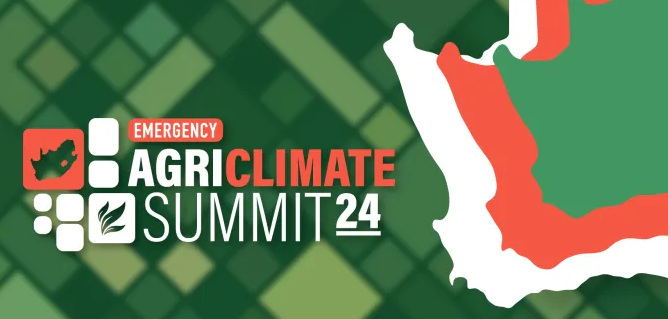
BLOG
Emergency Summit on Climate Change and Agriculture

On Friday, 18 October 2024, Agbiz attended the Emergency Summit on Climate Change and Agriculture, hosted by Food for Mzansi in Centurion. The summit brought together experts, farmers, and policymakers to discuss critical climate-related challenges affecting South Africa's agricultural sector, particularly erratic weather patterns, droughts, and rising temperatures. The event featured a mix of presentations, panel discussions, and testimonials from farmers adapting to climate change.
One of the standout presentations was delivered by Pieter van Niekerk, Principal Sales Manager at AgriCarbon. His presentation, titled Demystifying Carbon Credits: A Game-Changer or Just Hot Air?, explored carbon credit opportunities for the agricultural sector, particularly for fruit and wine growers. His insights focused on carbon offsets and future possibilities for carbon trading, especially in light of South Africa's Carbon Tax Act and the EU's proposed Cross-Border Carbon Tax.
We posed the following questions to Pieter:
• Can fruit tree growers apply for carbon credits? Current regulations largely focus on forestry; is there any guidance for how this might extend to fruit orchards?
• Are there calculations or estimates available for the carbon sequestration potential of fruit trees?
• Does carbon sequestration apply only to new plantings, or can existing orchards also qualify and benefit from this initiative?
• Are there calculations or estimates available for the carbon sequestration potential of fruit trees?
• Does carbon sequestration apply only to new plantings, or can existing orchards also qualify and benefit from this initiative?
Response from Pieter van Niekerk: Pieter provided a comprehensive response, including the following points:
• The methodology currently implemented is Verra’s VM0042. While it primarily focuses on improved agricultural land management, Verra is developing guidance to include orchards and vineyards. More information can be found here: Verra Methodology.
• Pieter emphasised the urgency of positioning the fruit and wine industry for compliance reporting, as failure to do so may have market access implications. Participation in carbon credit projects could be seen as double-counting if farmers also report emissions under Scope 3 supply chain requirements.
• He also highlighted the risks associated with inaccurate data being used to calculate sectoral emission targets. Excluding carbon removal from these calculations would significantly impact agriculture's net-zero targets.
• Although research on carbon sequestration potential in orchards is limited, Pieter suggested that practices such as cover cropping between rows and reducing fertiliser application could enhance sequestration. Both old and new orchards can potentially qualify for carbon credits, depending on the activities implemented.
• Pieter expressed a willingness to assist with further enquiries and offered to discuss export crops, especially to the EU, where carbon credit opportunities may arise.
Pieter has shared his presentation, which contains additional insights into carbon credit opportunities for the agricultural sector. We will further explore how these opportunities can be leveraged by our members, particularly in light of export demands and compliance challenges. Click here to see presentation.
The summit offered critical insights into climate adaptation strategies for agriculture. Pieter van Niekerk’s presentation on carbon credits was particularly relevant as it provided guidance on how fruit and wine growers could benefit from carbon offset programs. Agbiz will continue to monitor developments in this space to provide support and guidance to our members.
By Agbiz Digital Communications Manager Temba Msiza

0 COMMENTS
LEAVE A COMMENT